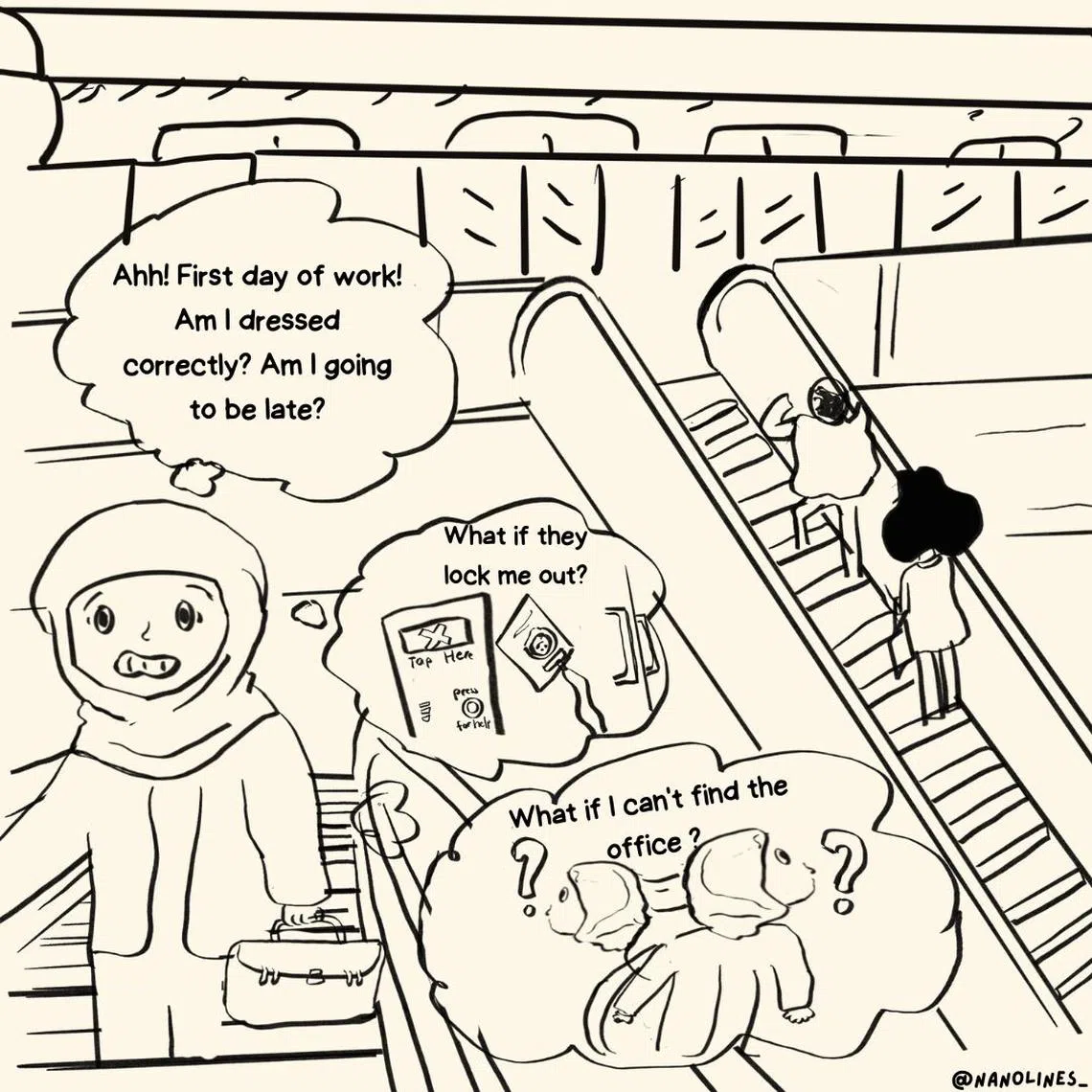🥶 Overcoming first job jitters

- Find out more and sign up for Thrive at bt.sg/thrive
🕶️ Going in blind

Embarking on your first job can be an exhilarating yet daunting experience. After all, everyone has to start somewhere in the workforce. 🧗 According to Esther Oon-Bybjerg, psychotherapist at Counseling Perspective, it is normal for emotions to run high during this important transition.
“Moving from school to the professional world brings with it a unique set of challenges, both at practical and psychological levels,” she says. Some common concerns among first jobbers include:
- What does it mean to interact professionally with my colleagues and line manager? How can I work well with my team?
- Will I be able to manage my time well, meet expectations and maintain a good working relationship with my boss?
- Am I dressing appropriately for work? Will people disrespect me if I’m dressed differently?
- What is the “right way” to conduct myself at work? Is being myself “too much”? On the flip-side, would I come across as being fake?
- How will I deal with toxic colleagues (in the event I encounter some 🐍), or workplace disagreements?
- Will I be able to adapt to working life?

Indeed, a young adult entering the working world often experiences a large degree of uncertainty and self-doubt. “Back in school where students follow a set curriculum and timetable, and feedback from teachers tends to be regular and forthcoming, young adults find themselves navigating a completely new system where job structures might not be as clear-cut,” explains Oon-Bybjerg.
“It is important to remember that such feelings are shared by many and even by the most seasoned colleagues, so young adults are hardly alone on this journey,” she adds.

💡 Working adult rookie hacks
Still doubtful about getting over jitters as a rookie employee? Here are some tips to ease yourself into your first job:
- Don’t blame yourself for being completely new and relatively inexperienced. At the same time, you shouldn’t act like you know it all. This could work against you, since you might come across as arrogant and leave a bad first impression.
- Do your research to understand your new role, and be clear in communicating with your supervisor if you have any queries.
- Demonstrate your willingness to learn and re-learn consistently as you make progress at work.
- Accept constructive criticism and be proactive in following up on specific ways to improve.
- Adopt a growth mindset, where you recognise that the mistakes you make at work are opportunities to learn and grow.
- Being overly apologetic or withdrawing at work when things don’t work out might be counterproductive. Opt to have a check-in with your manager if you do not feel confident about any aspect of your work.
- Show deference to your superiors and be respectful at the workplace. However, this does not mean that you should tolerate bad behaviour such as harassment of any kind – especially if someone is abusing their power.
- Reach out and be friendly with your colleagues and seniors because they’ll most likely be the ones showing you the ropes.
- Set aside some time regularly to reflect on how you are adjusting. Remember to show kindness to yourself in this initial part of your career journey. It’s not easy!
🛣️ The road ahead
Even after overcoming your initial nerves, the road ahead often remains bumpy, realistically speaking. Office politics, fear of making mistakes, or simply getting used to a fixed working schedule are common challenges for the average young adult.
Navigate Asia in
a new global order
Get the insights delivered to your inbox.
A common problem that festers among young first jobbers is imposter syndrome, says Oon-Bybjerg. She explains that imposter syndrome emerges over time as a pervasive feeling of being a fraud despite evidence of competence.
“One may feel as if they had oversold themselves at the interview, do not deserve their position or that their accomplishments are merely a result of luck,” she says. “Such feelings can be debilitating, as one fears that their ‘incompetence’ will one day get exposed.”
If your first job jitters persist and manifest into longer-term issues, here are some things you can do to alleviate your situation:
- Remind yourself of your past accomplishments – they validate your competence and help you believe that you can do them again. Such positive reframing can help eliminate negative thought patterns.
- Approaching differences at the workplace with humility and empathy can help in navigating difficult relationships or conflicts in a productive and professional manner.
- Refrain from comparing your progress and journey with your friends’ (no matter how tempting). Easier said than done, of course, especially when conversations around pay, titles and company prestige arise. It is, however, important to keep your confidence and sense of self-worth in check.
TL;DR
- Being nervous about your first-ever job is completely normal – so cut yourself some slack!
- Don’t withdraw when problems arise 😖; speak up clearly and respectfully 🗣️
- Establish clear communication channels with your supervisors to check in on your progress as a new employee
- Avoid falling prey to imposter syndrome by using positive reframing techniques to improve your self-esteem at work
Copyright SPH Media. All rights reserved.